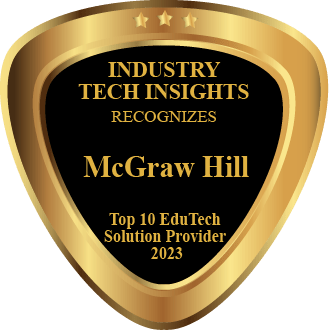
- July 5, 2025 6:22 pm
- California

McGraw Hill is a leading global education company that partners with millions of educators, learners and professionals around the world. Recognizing their diverse needs, we build trusted content, flexible tools and powerful digital platforms to help them achieve success on their own terms. Through our commitment to equity, accessibility and inclusion, we foster a culture of belonging that respects and reflects the diversity of the communities, learners and educators we serve. McGraw Hill has over 40 offices across North America, Asia, Australia, Europe, the Middle East and South America, and makes its learning solutions for PreK–12, higher education, professionals and others available in more than 80 languages.
McGraw Hill and Verizon announced several exciting updates to their augmented reality (AR) mobile app: McGraw Hill AR. The free, award-winning app, originally launched in June of 2022, is getting updated with expanded subject offerings as well as a new collaborative feature to foster group learning, both in and out of the physical classroom setting. The McGraw Hill AR app offers short, three-to-five-minute interactive activities aimed at helping engage students in new and impactful ways. Corresponding professionally developed lesson plans are exclusively available to K-12 educators nationwide through Verizon Innovative Learning HQ: a next-gen online education portal that provides free access to immersive extended reality (XR) educational experiences for K-12 students.
“Since the app’s launch last summer, it’s been amazing to see how it has fostered excitement and engagement in both students and teachers,” said Shawn Smith, Chief Innovation Officer for McGraw Hill’s School group. “As more educators and learners embrace AR and its benefits, we will continue enhancing the app’s offerings to improve the collaborative functions of the activities and make it available to more people than ever before.”
Social studies activities, which also cover ELA standards, are available now. The app will expand further this fall to include new science-related course offerings and math activities that build on the app’s original library of 10 math lessons.
Additional updates coming to the McGraw Hill AR app this year include a new multi-language feature that will offer Spanish versions of the original 10 math lessons. Also coming are web versions of the original 10 lessons, enabling even more students to access the activities via Chromebooks and other laptops. A new group functionality for select lessons will enable collaborative learning for students in the classroom or learning remotely. Lastly, a spatial mapping activity will be released later this year offering an even more immersive AR experience for students and educators. Most activities are aimed at grades 6-12, with some appropriate for upper elementary grades as well.
The latest app updates will be unveiled in the McGraw Hill booth between June 25-28 at the ISTE Live conference hosted by the International Society for Technology in Education in Philadelphia, PA.
“At Verizon, we are committed to providing equitable access to technology and the tools required to develop digital skills,” said Alex Servello, Director of Corporate Social Responsibility for Verizon. “With McGraw Hill AR’s device agnostic and multi-language activities in diverse subject areas, even more educators and students will be able to leverage immersive tech in the classroom. We are thrilled to continue partnering with McGraw Hill to offer free, high-quality learning experiences through Verizon Innovative Learning HQ.”
AR App Features Drive Collaboration Among Students
With 3-D capabilities and gamification, the AR app overcomes common challenges and promotes active learning by tying concepts to real-world elements. The self-driven and intuitive nature of the app encourages student agency and allows them to be more independent in their learning. The lessons are dynamic, standards-aligned, and high quality to promote deep conceptual understanding.
“The students found the app extremely easy to use. They were appropriately challenged by some of the exercises, but they weren’t discouraged at all, in fact, it was actually the opposite,” said Erin Lafond, a teacher at Benjamin Franklin Middle School in Teaneck, New Jersey, whose students use McGraw Hill AR. “They were so engaged that even when the bell rang, they didn’t want to leave the classroom and just wanted to figure out the current challenge.”
The Great Leader
McGraw Hill, the 130 year-old educational publishing company, is now a leading global provider of digital products and services in education, medical, business and trade sectors.
Karen Walker from Forbes spoke to Simon Allen, CEO of McGraw-Hill, “I’ve had 35 years in the industry, the first ten years in the U S. So when I moved to the international markets, I was able to think about the business from a U.S. perspective, which is actually very valuable. Our biggest international focus has been taking the brand (strong products and now technology) around the world. Before 2010, it was primarily the brand and the content in printed form. And because we are so well known, when I go into India through immigration the border patrol person will look at who I work for and say, “Oh, you’re with Tata McGraw Hill ! I use all your engineering books, I used your civil service books,” and so on. So even before you step into the country, you already have that recognition. It’s a wonderful feeling. We were the first to go into Spain. We were the first to go into Mexico and other parts of Latin America. We are in Singapore and we were very early in Australia and India. So we’ve really been focused on sharing the brand with the world, while continuing our focus on the quality of the content and the authorship. It’s what gives us so much pride. Of course, the vast majority of our revenue and our profit is earned in the U. S. We are determined to drive growth from our digitally delivered higher education and K-12 products. Although the global plan is centered around our platforms, we do, of course, localize our function.”
“In 2013, we created our own digital group. We have over 200 staff that operate purely from a software engineering perspective, creating material and platforms for us and managing our product flow.
Higher education particularly was growing rapidly. The higher up the age range you go, as you’d expect, the more affinity for a digitally delivered education. Our professional business, where we have a lot of medical product, is very heavily digitally delivered. Now there’s very little that we do in print. Our renewable digital subscription product sells the vast majority in that area because hospitals and students want immediate access to, for example, COVID information. We update that very frequently – certainly weekly, usually daily.”
“That’s critical because things are changing so rapidly in the medical and scientific community.
Then you drop down into the higher education group. 83% of our higher education business is digital. Pre-pandemic, it was roughly in the high sixties. I personally think it’s going to get upwards of 90% in fiscal year 2023.
In K-12, they’re the younger age range. There’s a distinct difference between grade six and 12, where there is a growing propensity for digital delivery. But K-5, there is definitely still a preference for print material from a literacy and math point of view. Our K-12 business total will be about 50% digital this coming year.
Our digital platform group team moved very quickly to ensure that we could launch products much faster than we had planned. The best example is a product called Virtual Labs. It’s designed for higher education students to be able to work in the lab virtually. Of course, the demand for this skyrocketed from March to May of 2020. While you’ll never replicate a physical lab experience completely, this most definitely takes you through the processes and the preparation that you need to think about your lab.
We accelerated McGraw Hill Rise, an adaptive K-12 program that allowed teachers to recognize, “What is the COVID gap? Where are the students in math and literacy? How much have they lost?” And as you know, it was often six to nine months of learning that was lost.
Teachers needed to be able to identify the gap, who has it and how big is it so that we can address it and rectify it. So I’m immensely proud of the group that made that platform happen so quickly.
And on top of that, like everybody, our team of nearly 4,000 people around the world were suddenly working 100% remote. I couldn’t believe how well we adapted and how rapidly people were able to work and adjust. We were pretty flexible at that time, and we are now officially a hybrid company because we’ve proven that we can operate this way very successfully. We had an excellent financial year last year.”
New AI Enhancement to McGraw Hill’s ALEKS Math and Chemistry Program
Following three years of research and development, McGraw Hill has announced the deployment of deep learning neural networks into the artificial intelligence behind its ALEKS math and chemistry program, making it more efficient and effective for student learning. This is the latest innovation to the award-winning digital program that has been used by students and educators in K-12 schools and higher education institutions for more than two decades.
“Our year-to-date results reflect the strength of our execution and consistency of our delivery,” said Simon Allen, CEO of McGraw Hill. “During the quarter, we continued to strategically invest in those parts of the business that we believe will strengthen our leadership position, sustain our strong margins and expand our digital transformation.”
ALEKS is intuitive and easy to use for both instructors and students, but under the hood is a sophisticated and deeply researched engine. Using deep learning neural networks, which is a form of machine learning that uses algorithms in a way that resembles the human brain, the ALEKS AI is now able to reduce the amount of time students spend on the program’s assessments by more than 20%, therefore allowing students more time to learn new topics within the program. Research comparing student learning in the program before and after the neural network update was implemented shows that for the same amount of time spent in ALEKS, students now master 9% more course material with the improved AI.
“Given the scarcity of time to learn and teach new material in the busy lives of students and educators, this is meaningful improvement,” said Lori Anderson, Chief Product Officer for ALEKS. “We’re fortunate at McGraw Hill to have access to billions of learning data points from over 20 years of ALEKS use. Using this anonymized data, our product development teams have been able to continually enhance our algorithms to deliver more personalized learning experiences that successfully improve student outcomes.”
ALEKS is built on the foundation of Knowledge Space Theory, the mathematical approach to the modeling, assessment and guiding of student knowledge and learning. Students are assigned periodic Knowledge Checks, or mini assessments, that evaluate precisely what they know and what they are ready to learn next. This groundbreaking adaptive technology has been shown to improve student outcomes by several independent research studies.
This latest AI innovation was implemented to strengthen the ALEKS platform’s adaptive learning technology, to meet evolving student learning behaviors and pedagogical approaches. Deep learning algorithms leverage the large trove of ALEKS data to help identify subtle patterns in the ways students learn and perform, resulting in assessments that more quickly and accurately measure a student’s knowledge state.
ALEKS can also precisely identify when a student may need additional testing and practice to enforce long-term retention and ensure that each student’s dynamic learning path is pedagogically sound. ALEKS will continue to apply the most impactful AI principles to its product portfolio to evolve with student and educator needs

" We are determined to drive growth from our digitally delivered higher education and K-12 products. Although the global plan is centered around our platforms, we do, of course, localize our function "